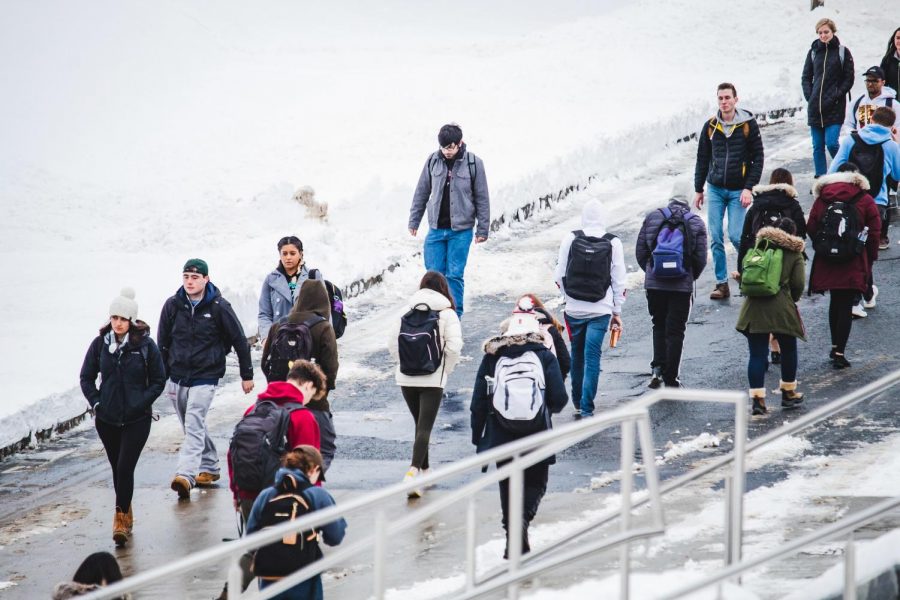One month after their spring break, some University of Massachusetts students talk about their experience traveling during the COVID-19 pandemic.
With stories on the news such as the New York teen whose father wouldn’t let him come home after going to South Padre Island, TX for spring break, some UMass students talk about traveling and the aftermath of coming back home.
For sophomore accounting major Haylee Braga, her flight to Naples, Florida spring break was nerve-wracking.
“I packed a whole container of Lysol wipes and as much hand sanitizer as I could fit in my carry-on,” said Braga.
The Marlborough, Massachusetts native considered cancelling her spring break trip after travel advisories and bought insurance for her flight in case she needed to cancel. She said that her parents did not want her to go to Florida and tried to convince her to book an early flight home fearing that she would be stuck there if travel bans were implemented.
“I flew out of Boston Logan Airport on the way there and Southwest Florida International Airport on the way back. Both airports were not nearly as busy as they normally are— absolutely no lines when going through security,” said Braga.
Naples, which Braga described as “largely a senior community,” didn’t feel any different to Braga when she first arrived. However, four days later officials began to close down the beaches and other public areas.
“Restaurants began to implement take-out only options or reduced their capacity dramatically, so our dinner reservations actually got cancelled one night due to these changes,” said Braga.
When Braga returned home, she wasn’t allowed to be in contact with her mom who takes care of her elderly grandparents. She quarantined for two weeks in the downstairs section of her house and said she “used separate bathrooms/kitchens from the rest of my family to prevent spreading the virus.”
Aysha Marianna Vadukul, a freshman biology major, said that she had no choice but to fly to San Juan, Puerto Rico for spring break after her plans to go to Spain to see her mom and brother were cancelled due to the European travel ban placed by the Trump administration in mid-March.
“I was very nervous about traveling during the COVID-19 pandemic but I had nowhere else to go,” said Vadukul. “That’s why I ended up going to Puerto Rico because the flight is not considered international and I went to stay with my boyfriend’s family. I also have family in Puerto Rico so it worked out well. I no longer live in [Massachusetts], so I couldn’t go there for spring break.”
Vadukul flew out of Bradley International Airport and said, “the airport was empty and almost everybody had a mask on.”
“It was as if everyone was walking on eggshells. Everyone was keeping their distance and looking at one another with fear in their eyes,” said Vadukul.
While flying, Vadukul listened to precautions from her mother and wore a mask, gloves, as well as long pants and a sweatshirt for minimal contact. She applied hand sanitizer frequently and wiped down her seat on the plane.
Once she landed in San Juan, Vadukul quarantined at her boyfriend’s house for the entire spring break.
“I didn’t go to the beach, I didn’t go out to eat, I didn’t do anything that was planned,” she said.
After a month in Puerto Rico she flew to West Palm Beach, Florida to stay with her aunt. She self-quarantined in their house for 14 days. Vadukul said that no one treated her any differently other than six feet of social distancing.
“When I got picked up from the airport, my family was precautious and didn’t hug me or anything like that until I changed and took a shower,” said Vadukul.
But for junior psychology and public health major Victoria Ferrara-Lawlor, traveling for spring break was not an option.
Ferrara-Lawlor had planned to go to Sweden and Denmark with her boyfriend, a UMass study abroad student, when the European travel ban was implemented.
“The government’s decision to put the Schengen area as a level three/level four travel advisory really was the final blow. I had been anxious that whole week something would happen, and then the announcement came. I had a feeling UMass study abroad would pull students from the European Study Abroad programs soon enough,” said Ferrara-Lawlor. The travel ban came four days before her flight was supposed to leave.
“Then, UMass told us we were going remote. In the end, I had to cancel my trip because of the sheer obstacles I would’ve had to face going over there. Plus, my suspicions were correct because my boyfriend was sent home that Sunday from Sweden. We wouldn’t have had anywhere to stay if I went,” said Ferrara-Lawlor.
Ferrara-Lawlor also worried that traveling would mean that she would not be able to come back into the U.S.
“At the time, COVID-19 hadn’t really gotten bad in some European countries. Sweden and Denmark had a handful of cases and were handling them. Personally, I wasn’t nervous. I think I worried the U.S. would bar me from coming home, or that the countries I was traveling to might close their border,” she said.
Despite the disappointment of having to cancel her trip, Ferrara-Lawlor believes that it was the best decision and does not regret it.
“I was never worried about the virus, but I was worried about other people, about traveling alone when people are stressed about a global pandemic. I’m really sad I couldn’t see Stockholm or Copenhagen, but all of the museums and shops would have been closed. My boyfriend and I are hoping to use the money from the trip to go somewhere when this all ends.”
Maria Elena Little Endara can be reached at [email protected].




















